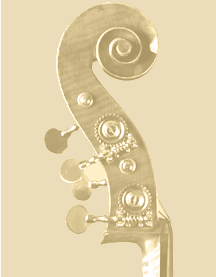Cleaning
an upright bass
We are often asked: How to clean an upright bass? Generally
speaking and depending on the bass, the dirt, the age and type of
varnish, there are a few good, (safe) ways to clean an upright.
First, one should NEVER use a commercial furniture spray polish
or wax on a good bass. Why not? These furniture polish sprays
mostly have alcohol and other type of solvents that can thin the
varnish, or damage it in other ways.
Next, ask yourself what kinds of debris you are cleaning off.
We sometimes get a double bass that seems as though it has never
been cleaned, and has a think layer of rosin stuck on top of the
finish, primarily accumulating around the bridge area and top of
inner ribs (called C-bouts). Other basses, maybe because the
player hardly ever used a bow, would just have dirt from handling
or on top of the shoulders.
While every bass is different, we like to start with a mild cleaner
that will dissolve rosin and dirt. The strongest cleaners,
(with lots of Xylene) work great, but can actually take some varnish
off with it! (Yikes!!!). Many don't realize that this
is why some of these cleaners work so well is that they "heat"
up the varnish so much (to dissolve the rosin) that they can take
a thin layer of varnish off with it as well. Some basses actually
have had to be re-varnished because the owner cleaned and polished
so often. This is rare and should teach of us to wipe off
our basses more often.
We like to use a product called Citri-solv which you can
either find in the supermarket, or at any Home Depot. Always
try an isolated spot (like underneath the bass near the endpin)
to make sure your varnish can handle this ok. Also, use a
good paper towel. Pick out a 6" square on your bass and
lightly clean off the rosin, rubbing lightly and with the grain
if at all possible. When the paper towel is dirty, throw it
away and use another one. This way, you will not be spreading
and smearing rosin all over the bass with a dirty rag. Clean,
remove, then throw the paper towel away and repeat. Often
after a cleaning, you will always have to add some nice, oily polish
back on. (I personally like Kolsteins and another one to get
is Weishar's violin polish. (It costs more, but still pretty decent
knowing that this is safe for some very expensive violins!)
The Weishar's comes in slightly smaller bottles and will not last
as long as a bottle of the Kolsteins. Kolstein also makes
a decent cleaner, but it is pretty strong. Use this when the
rosin is really thick or very sparingly, in a well ventilated
area. Don't be tempted to use too much at once.
Use a little bit, clean, then go over it again gently if need be.
Pick a spot (preferably out doors) and in a shaded area. This
cleaning stuff can smell up the whole house and anything that makes
you dizzy, cannot be good! Whether you realize it or not, the skin
absorbs these chemicals, so use rubber gloves. I prefer the
tight surgical type that you can find at Costco or Home Depot.
Last (but not least) after you clean, and re-polish your bass, don't
just put the bass cover on it if you can help it. Try and
leave it for a few hours. This way, if any spots of the varnish
are 'warm' or soft to the touch your bass cover won't then leave
an imprint on it.
|


